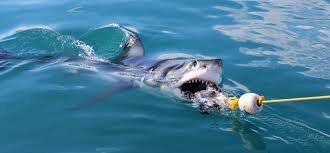Science News Roundup: British fossil hunters find bones of new dinosaur species, cousin to T.Rex; 'Secret' life of sharks and more
Researchers said on Wednesday they identified the pheromone - a chemical produced by an animal that affects the behavior of others of its own species - in the world's most widespread locust species, the migratory locust, or Locusta migratoria.

- Country:
- United States
Following is a summary of current science news briefs.
UC San Diego research lab to make environmentally friendly flip flops from algae
Researchers at the University of California, San Diego hope to make future beach visits both environmentally and fashion-friendly, with a new formula for biodegradable flip flops. Mike Burkart, professor of chemistry and biochemistry at the public research university in San Diego, California, has developed a polymer from algae, which decomposes naturally.
British fossil hunters find bones of new dinosaur species, cousin to T.Rex
Four bones found on a beach on the Isle of Wight, off England's south coast, belong to a new species of theropod dinosaur, the group that includes Tyrannosaurus rex, researchers at the University of Southampton said on Wednesday. The new dinosaur, which has been named Vectaerovenator inopinatus, lived in the Cretaceous period 115 million years ago and was estimated to have been up to four metres long, the palaeontologists said.
Mystery of the dimming of massive star Betelgeuse explained
Astronomers have determined the cause of the dramatic dimming observed last year and earlier this year of one of the brightest stars in the night sky, a colossus called Betelgeuse that appears to be on its way toward a violent death. Based on Hubble Space Telescope observations, scientists said they believe Betelgeuse ejected a huge hot, dense cloud of material into space that cooled to form dust, shielding the star's light and making it appear dimmer from the perspective of viewers on Earth.
'Secret' life of sharks: Study reveals their surprising social networks
Sharks have more complex social lives than previously known, as shown by a study finding that gray reef sharks in the Pacific Ocean cultivate surprising social networks with one another and develop bonds that can endure for years. The research focused on the social behavior of 41 reef sharks around the Palmyra Atoll, about 1,000 miles (1,600 km) southwest of Hawaii, using acoustic transmitters to track them and camera tags to gain greater clarity into their interactions.
Chemical signal for locust swarming identified in step toward curbing plagues
Scientists have identified a chemical compound released by locusts that causes them to swarm, opening the door to possible new ways to prevent these insects from devouring crops vital to human sustenance as they have for millennia. Researchers said on Wednesday they identified the pheromone - a chemical produced by an animal that affects the behavior of others of its own species - in the world's most widespread locust species, the migratory locust, or Locusta migratoria.
(With inputs from agencies.)










